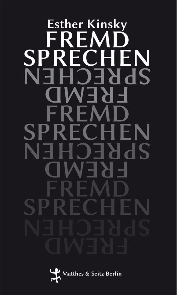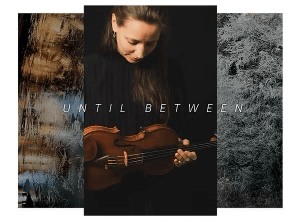I had a wonderfully topical week recently. I read a fantastic essay on translation and went to an album launch in London - it turned out that there were many common threads to discover and mull over.
I am reading…
The book is called ‘Fremdsprechen’, by Esther Kinsky. You could translate the title as speaking foreign, or speaking foreign languages, if you like a more direct, no-nonsense approach. You might like to try stranger-tongued, if you are poetically inclined. All I can say is that this conundrum is precisely the topic of the book, written by a German author, poet, and translator.
Drawing from her own experiences as a translator and interpreter, Kinsky examines how the images in our minds change through the constant act of renaming, and how memory influences the ideas, feelings and the power we assign to words and thus affect the countless word choices made during translation.
She explores how we become acquainted with a foreign language, first on a collective level and then on a more personal one, developing an individual relationship with these new words and phrases.

The gap between the familiar and the strange might gradually narrow when learning and living within a foreign language and its culture. Kinsky is adamant though, that it is exactly this gap that is needed when translating someone else’s work, as the closer the languages are tied to the translator’s own history, the more resistance there is to using the words that are to be translated without their own personal context and history.
Übersetzung ist die Kunst, die mit dem Menschsein unlösbar verbundene Erfahrung der Fremde auf der Ebene der Sprache zu gestalten.
Translation is the art of shaping, at the level of language, the experience of foreignness that is inseparably bound to being human.
“Die Fremde” carries a deep sense of strangeness, otherness, and the foreign realm - a concept heavy with a certain loneliness and dislocation. Does the English “foreignness” hold the same resonances for you?
Kinsky’s essay traces the fine line that separates one’s personal sense of a word from another’s — even within the same language. It is a deeply personal meditation on the art of translation rather than a handbook of rules.
I am listening
The subject of Fremde/foreignness, the question of home, and the gap between is also being explored and shaped in this new project and recording by German violinist Marie Schreer, called ‘ until between’
Three new compositions and poetry - by composer and creative instigator Aaron Holloway-Nahum, composer Ashkan Behzadi, poet Taher Adel and Marie Schreer form a conversation about home.
In her own words, Marie describes the process of putting together the project and recording :
“What began as a conversation about “home” gradually evolved into something much more: a project stretching from our own individual identities to questions around borders and rights to homeland. Our sense of place and self is never as fixed as it seems, but always shifting, shaped by memory, history, and transformation. The title until between captures this state of in-betweenness: neither entirely anchored nor rootless, but constantly moving through spaces of identity, memory and language.”
Nuances of home or Heimat (again a word so heavy with meaning - from my German perspective it carries both the beloved associations of German Romanticism and the darker layers of Nazi Germany, alongside a very personal and fluid understanding of the term) are found in Marie’s improvisatory composition ‘All things must be audible at all times’, where realities compete, and the relationship between language and identity is explored, in Aaron’s multimedia docu-composition ‘If I am from somewhere, I am from there’, where members of Marie’s family make an appearance in one way or another as do places close to her heart, in Ashkan’s ‘Ballads’ (in collaboration with Taher), created against the evolving catastrophe and genocide in Gaza, and in Taher’s ‘Arabic Names for Home’, where the writer uses six of the many Arabic words for home and turns them over whilst trying to catch a close (enough) English translation. What do home, independence, fortress or refugee mean - to and for us - right now? And what about tomorrow?

A powerful project! I loved the launch concert at the Soundscape studio in Hackney, which was actually more than a concert. It was a mix of live music, discussion, and recorded pieces - multi-media in the truest sense, and a concept that cries out to be developed further... perhaps as a series!
till next time,
Kirsten
the album was recorded in Cologne for a co-production with Coviello Contemporaryand Deutschlandfunk, to be released later this year